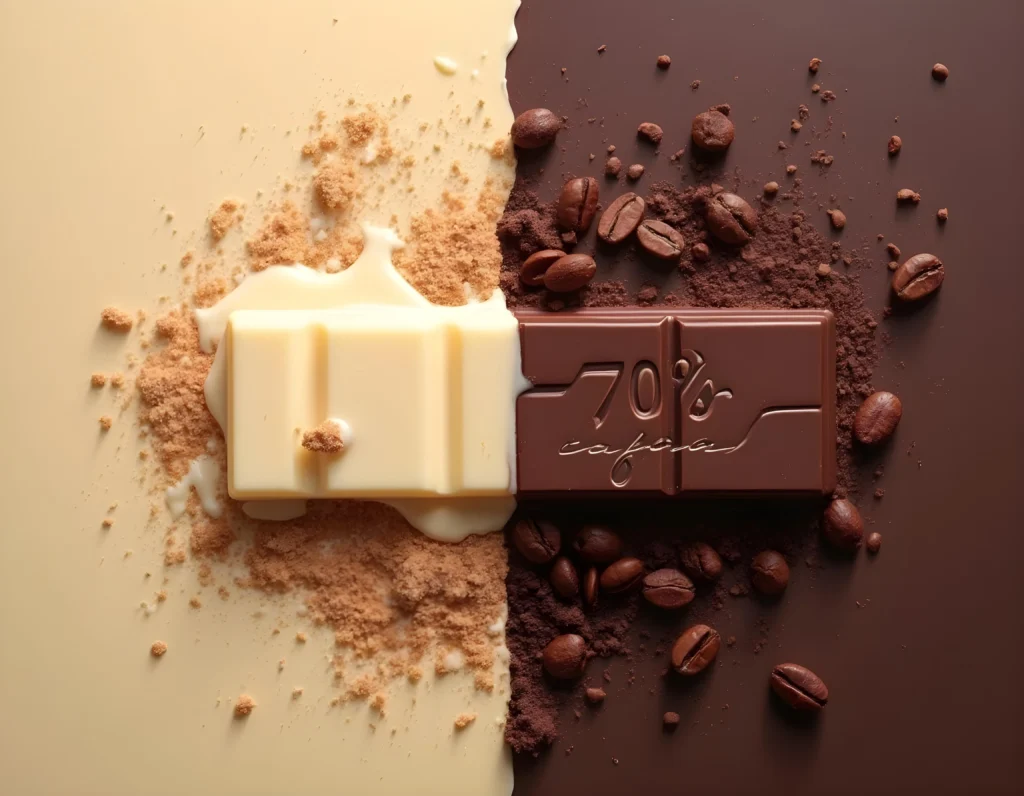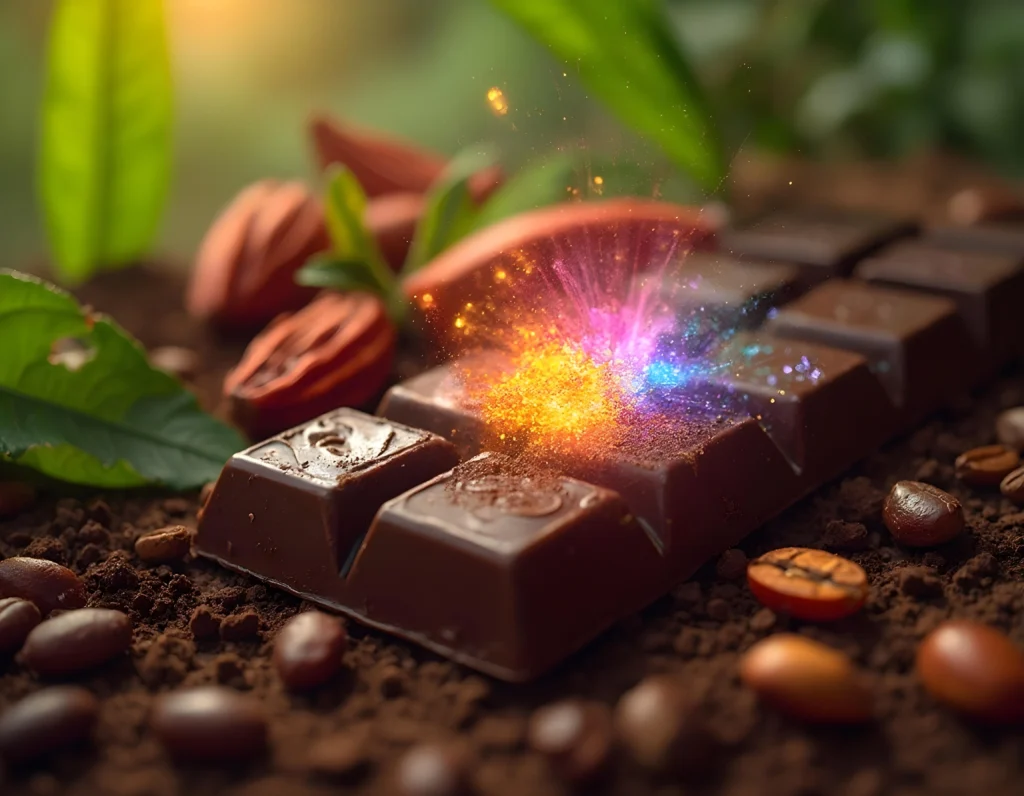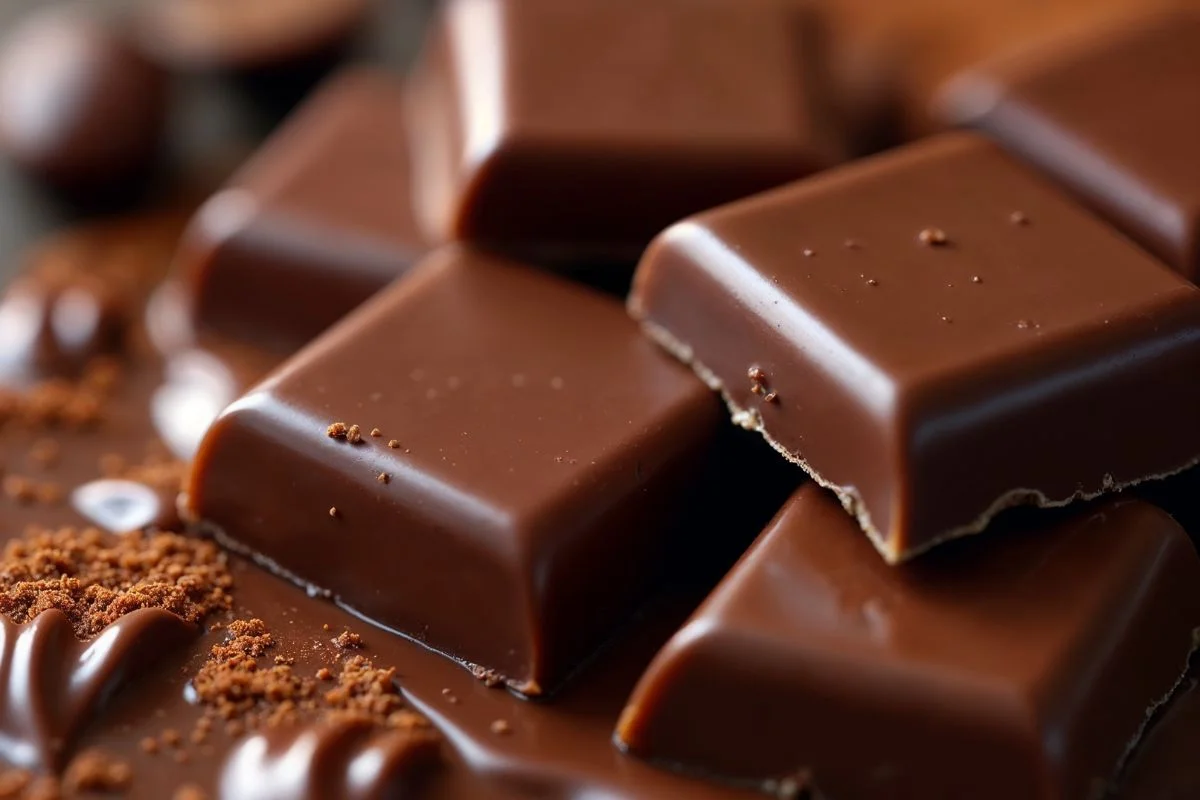Chocolate—that delicious, indulgent treat many of us simply cannot resist. Whether it’s a creamy milk chocolate bar, a rich dark chocolate square, or a velvety chocolate dessert, there’s something about this confection that keeps us coming back for more. But why is it that so many of us find ourselves constantly craving chocolate? Why do some people feel almost addicted to it?
In this article, we’ll dive deep into the science and psychology behind chocolate addiction. By understanding the factors at play, we can better manage our cravings and explore why chocolate holds such a powerful grip over us.
The Chemistry of Chocolate: Why Does It Feel So Good?
Chocolate’s allure begins with its chemical composition. When you consume chocolate, especially those with high cacao content, you’re exposed to a variety of compounds that contribute to feelings of pleasure and well-being. Let’s explore some key players in this process.
1. Theobromine: Chocolate’s Energy Booster
One of the primary compounds in chocolate is theobromine, which is chemically similar to caffeine. While theobromine is milder, it still offers a stimulating effect, increasing alertness and providing a mild energy boost. The feeling you get after eating chocolate, especially dark chocolate, can be attributed to the effects of theobromine on your central nervous system. Theobromine also helps dilate blood vessels, improving blood flow and leading to feelings of relaxation and comfort.
Though theobromine doesn’t give you the same jittery high as caffeine, its long-lasting effect keeps you feeling alert and satisfied for longer periods. This mild stimulant effect is particularly prevalent in dark chocolate, which contains more theobromine than milk chocolate varieties.
2. Serotonin and Dopamine: Chocolate’s Happiness Hormones
Chocolate also triggers the release of two critical neurotransmitters: serotonin and dopamine. These “feel-good” chemicals play a pivotal role in regulating mood, emotion, and pleasure. When you eat chocolate, your brain gets a rush of dopamine, which can contribute to feelings of euphoria. Meanwhile, serotonin helps to regulate your mood, reducing anxiety and promoting a sense of calm.
Serotonin is especially important because it’s associated with reducing stress and improving mood. Many antidepressants work by increasing serotonin levels, and chocolate seems to provide a natural, albeit temporary, boost in these mood-regulating hormones. For people who often feel stressed, anxious, or depressed, chocolate becomes a go-to food to elevate their mood.
3. Phenylethylamine: The Love Drug
Phenylethylamine (PEA) is another intriguing compound found in chocolate. Often called the “love drug,” PEA stimulates the release of endorphins, similar to the feelings experienced when falling in love. This compound contributes to the uplifting effect of chocolate and may explain why some people describe their chocolate cravings as almost romantic in nature.
Interestingly, PEA breaks down quickly in the body, so its effects may be short-lived. However, for those moments when you savor a piece of chocolate, the rush of endorphins makes the experience feel intense and memorable, often leading people to crave more. This chemical connection to love and happiness only reinforces the idea that chocolate is more than just food—it’s an emotional experience.
The Sugar Factor: Why Do We Crave Sweetness?

In addition to its chemical properties, chocolate’s sugar content plays a crucial role in why you may feel addicted to it. Sugar is highly palatable and rewarding. It triggers the brain’s reward center, leading to the release of dopamine, the same neurotransmitter involved in drug addiction. The more sugar you consume, the more your brain craves that pleasurable dopamine rush, setting the stage for a pattern of habitual behavior.
1. The Brain’s Reaction to Sugar
Several studies have shown that the brain reacts to sugar in ways similar to how it reacts to addictive substances like nicotine or cocaine. This reaction may help explain why some people describe feeling “hooked” on chocolate, particularly when they consume high-sugar varieties, such as milk chocolate or chocolate candies.
This addictive response to sugar is compounded by chocolate’s fat content. Foods high in both sugar and fat are particularly difficult for the brain to resist because they engage the brain’s pleasure pathways so intensely. When sugar and fat are combined, like in most chocolates, the reward center of your brain lights up in ways that make it nearly impossible to stop at just one piece.
2. The Role of Milk Chocolate vs. Dark Chocolate

Milk chocolate tends to be sweeter and creamier than dark chocolate, which makes it more addictive for many people. While dark chocolate contains more cacao, milk chocolate has higher sugar content, which can drive the addiction-like behavior. This doesn’t mean that dark chocolate is entirely off the hook, but its higher cacao and lower sugar content make it less likely to trigger extreme cravings compared to milk chocolate.
For a deeper understanding of the health benefits and differences between various types of chocolate, you can read about 85% dark chocolate’s health benefits.
Emotional Eating: The Psychological Roots of Chocolate Addiction
While the chemistry of chocolate is fascinating, psychology also plays a significant role in why you might feel addicted to chocolate. Emotional eating, stress, and the way chocolate is marketed all contribute to our cravings. Let’s break down these factors.
1. Stress and Comfort
Many people turn to chocolate as a comfort food. Stress, anxiety, and negative emotions often lead to cravings for indulgent treats like chocolate. This behavior is known as emotional eating, where individuals seek solace in food to cope with their emotions. The rich, smooth texture and sweetness of chocolate provide a sensory experience that can offer temporary relief from stress and worry.
Studies show that when you’re feeling stressed or anxious, your body produces higher levels of the hormone cortisol. Elevated cortisol levels can lead to cravings for high-fat, high-sugar foods, like chocolate. This connection between stress and food cravings makes it easy to see why chocolate, in particular, is a common go-to during emotionally challenging times.
In a study published by the Journal of Affective Disorders, researchers found that emotional eaters are more likely to crave and consume chocolate during times of distress source. The pleasure derived from eating chocolate becomes a short-term coping mechanism, reinforcing the idea that chocolate is not just a food, but an emotional balm.
2. The Comfort of Childhood Memories
Another psychological aspect of chocolate cravings ties back to childhood. For many people, chocolate is associated with positive memories of celebrations, rewards, and love. Whether it was a birthday cake, a Halloween treat, or a holiday gift, chocolate often plays a starring role in many cherished childhood moments. This emotional connection can lead to cravings in adulthood, especially during times of stress or nostalgia.
In addition to providing comfort, the act of eating chocolate can trigger these positive memories, making it more than just a food—it becomes a link to happiness, care, and affection from your past. This connection reinforces chocolate’s ability to make us feel good in the present.
Is Chocolate Addiction Real?
While some people use the term “chocolate addiction” casually, the idea of being genuinely addicted to chocolate is still debated within the scientific community. Addiction typically involves compulsive behaviors, withdrawal symptoms, and the inability to control consumption, which are traits more commonly associated with substances like drugs or alcohol. However, chocolate does contain psychoactive compounds and can activate the brain’s reward system in ways that mirror addiction.
1. Can You Be Addicted to Chocolate?
Research published in Frontiers in Nutrition supports the idea that foods high in sugar and fat, such as chocolate, can trigger addictive behaviors in certain individuals. These people may exhibit signs of dependence, such as intense cravings, the need to consume more chocolate over time, and difficulty stopping once they start source.
Unlike traditional addictions, chocolate addiction lacks the physiological dependence seen with drugs or alcohol, but it can certainly create a psychological dependence. The feelings of comfort, pleasure, and satisfaction that chocolate provides can make it difficult for some people to resist or stop consuming it, leading to a pattern of overindulgence.
2. Food Addiction and Chocolate’s Role
The concept of food addiction has gained traction in recent years, particularly as we learn more about how certain foods affect the brain. Some researchers believe that highly palatable foods—those high in sugar, fat, and salt—trigger the same reward pathways in the brain as addictive drugs.
In chocolate’s case, its combination of sugar, fat, and psychoactive compounds like theobromine makes it a prime candidate for food addiction. If you find yourself unable to stop at just one piece of chocolate, or if you crave it even when you’re not hungry, you might be experiencing some signs of food addiction.
How Chocolate Affects the Body: Beyond Cravings

While we’ve explored the psychological and chemical triggers behind chocolate cravings, it’s essential to understand how chocolate affects the body beyond its role as a craving inducer. Here are some notable ways chocolate, especially dark varieties, impacts your health.
1. Antioxidant Properties of Dark Chocolate
Dark chocolate, particularly those with a high percentage of cacao, contains a wealth of antioxidants. These compounds, known as flavonoids, help to reduce inflammation and combat free radicals in the body. By neutralizing these harmful molecules, antioxidants can potentially reduce the risk of chronic diseases such as heart disease and cancer.
For more on how dark chocolate can benefit your health, check out this detailed article on dark chocolate and its impact on the body source.
2. Mood Improvement and Stress Reduction
As discussed earlier, chocolate’s impact on mood is one of the primary reasons people feel drawn to it. The release of serotonin and dopamine helps to create a sense of well-being, making it easier to deal with stress and anxiety. In this sense, chocolate can be part of a healthy diet when consumed mindfully, providing mood-enhancing benefits without causing harm.
3. Cacao’s Impact on Brain Function
Cacao, the main ingredient in chocolate, has been shown to improve cognitive function, thanks to its high flavonoid content. Regular consumption of cacao-rich dark chocolate can improve blood flow to the brain, which can enhance memory, focus, and cognitive performance. This is another reason why dark chocolate can be a healthier choice for those who crave chocolate but want to avoid the excess sugar found in milk varieties.
Managing Chocolate Cravings: How to Break the Cycle
If you feel like chocolate has a strong hold over you, you’re not alone. But breaking the cycle of cravings doesn’t have to be impossible. Here are some effective strategies for managing chocolate cravings and finding balance in your diet.
1. Opt for Dark Chocolate
Dark chocolate, especially those with over 70% cacao, contains less sugar and more beneficial compounds like antioxidants. It satisfies chocolate cravings without triggering the intense dopamine rush that comes from high-sugar varieties. Additionally, the rich flavor of dark chocolate tends to be more satiating, so you may need less to feel satisfied.
For some healthy chocolate alternatives, try making chocolate mousse with dark chocolate, a recipe you can find here.
2. Mindful Eating
One way to reduce chocolate cravings is to practice mindful eating. This involves being fully present while eating and savoring each bite, rather than mindlessly snacking. When you slow down and truly enjoy your food, you’re more likely to feel satisfied and less likely to overindulge. Studies suggest that mindfulness can help reduce binge-eating behaviors and improve your relationship with food source.
3. Identify Emotional Triggers
If stress or emotions drive your chocolate cravings, it’s important to identify those triggers and address them directly. Instead of turning to chocolate for comfort, find healthier coping mechanisms, such as exercise, meditation, or talking to a friend. This can help you break the habit of reaching for chocolate during difficult moments.
4. Eat Balanced Meals
Ensuring you consume balanced meals that include protein, healthy fats, and fiber can help reduce sugar cravings. When your body receives adequate nutrients, you’re less likely to experience the energy crashes that often lead to chocolate cravings. Focus on whole, nutrient-dense foods to stabilize blood sugar levels and keep cravings at bay.
5. Limit Availability
Another simple tactic is to limit the availability of chocolate in your home. If you don’t have easy access to chocolate, you’ll be less likely to indulge in moments of weakness. This doesn’t mean you have to cut out chocolate entirely, but creating a barrier can help reduce impulsive snacking.
FAQ
1. Why am I addicted to chocolate?
Chocolate contains compounds like theobromine, phenylethylamine, and sugar, which stimulate the brain’s reward system. These chemicals release “feel-good” hormones such as dopamine and serotonin, making you crave more. Emotional eating, stress, and chocolate’s association with comfort further reinforce these cravings.
2. How do I stop craving chocolate?
You can manage your chocolate cravings by opting for dark chocolate, practicing mindful eating, and identifying emotional triggers. Maintaining a balanced diet with adequate protein, fiber, and healthy fats can also help control sugar cravings. Reducing chocolate’s availability in your environment may limit impulsive consumption.
3. Is chocolate addiction real?
While “chocolate addiction” isn’t officially classified as a true addiction like drugs or alcohol, chocolate can create dependency-like behavior in some individuals. Its combination of sugar, fat, and psychoactive compounds can trigger the brain’s reward center, leading to intense cravings and difficulty controlling consumption.
4. Why do I crave chocolate when stressed?
Stress increases levels of the hormone cortisol, which can lead to cravings for high-sugar and high-fat foods, including chocolate. The serotonin boost from chocolate consumption temporarily reduces stress and improves mood, reinforcing the desire for it during stressful times.
5. Does dark chocolate help reduce chocolate addiction?
Yes, dark chocolate contains less sugar and more cacao, which makes it less addictive compared to milk chocolate. The higher cacao content also provides more antioxidants, offering health benefits without triggering intense sugar-driven cravings.
6. What are the health benefits of eating dark chocolate?
Dark chocolate, especially with over 70% cacao, contains antioxidants that help reduce inflammation, lower blood pressure, and improve brain function. Regular consumption in moderation may also reduce the risk of heart disease due to its flavonoid content.
7. Why do I crave chocolate at night?
Nighttime chocolate cravings often occur due to emotional triggers, stress, or a lack of nutrients throughout the day. When you’re tired or winding down, your body may seek a quick energy boost from sugar and fat found in chocolate.
Conclusion:
So, why are you addicted to chocolate? The answer lies in a combination of factors: the stimulating effects of compounds like theobromine and phenylethylamine, the dopamine boost from sugar, and the emotional comfort associated with chocolate. Together, these factors can create a powerful craving that feels difficult to resist.
However, understanding the science and psychology behind your chocolate cravings can empower you to take control. By opting for healthier chocolate varieties, practicing mindful eating, and addressing emotional triggers, you can enjoy chocolate in moderation without feeling overwhelmed by cravings.
Ultimately, chocolate is not inherently harmful when consumed mindfully and in moderation. So, rather than viewing chocolate as an addiction, you can embrace it as one of life’s simple pleasures—just with a little more awareness.

